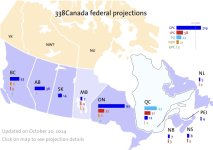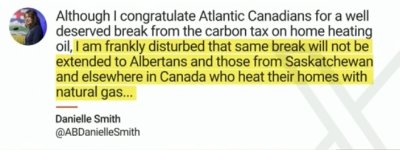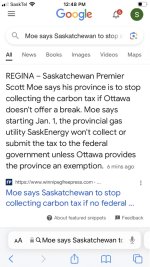Well, some are oil producing provinces, and those are bad, bad for everyone and everything, and those in the lead for being this kind of bad are Alberta, Saskatchewan, and Newfoundland. See Chart in Post #6. That seems to be the biggest coincidence.
Other Provinces produce Food Crops that outdo their smaller populations so they export much of these crops. Maybe it’s an agricultural grains thing, and maybe it’s another coincidence.
Other Provinces have Conservative Governments, but that too might be another coincidence.
Some Provinces hit the Trifecta of the above, while others only hit two out of three. Interesting that AB, SK, & NL are the biggest baddies that need to be punished. I don’t know what the answer actually is…
Then in post #65 here on page 4….
The government is creating a carve-out for the carbon tax on home heating oil, Prime Minister Justin Trudeau said Thursday.
The government will exempt home heating oil from the tax for three years, double the rural supplement in the rebate program and offer new programs Trudeau said will help rural Canadians switch to electric heat pumps….if they can afford them…& then what?
Exemption for three Years. It’s Oct 2023, so to October 2026 (not October 2025 when the next Federal Election will happen)…so how very transparent. While the exemption applies nationwide, Trudeau said the policy will help Atlantic Canada in particular. Thirty per cent of homeowners in the region still use furnace oil to heat their homes….& why Atlantic Canada? These are the 2021 Federal election results:
View attachment 19772
And….and these are the current projections:
View attachment 19773
Just last year, the Conservatives put forward a non-binding motion to remove the carbon tax from home heating fuel.
Most Liberal MPs voted against it. Oh well.
The government is creating a carve-out for the carbon tax on home heating oil, Prime Minister Justin Trudeau said Thursday.

apple.news
The legal issue stems from Prime Minister Justin Trudeau’s decision to remove the carbon tax from furnace oil — a popular fuel source in parts of Atlantic Canada.
When the Supreme Court okayed Trudeau’s carbon tax, it was because the government argued a national problem needs a national solution.
The court
ruled Ottawa could set minimum national standards for emissions reductions under the Constitution’s
peace, order and good government clause: “The proposed matter of establishing minimum national standards of GHG price stringency to reduce GHG emissions is of clear concern to Canada as a whole,” the court wrote.
The court went on to note that “the withdrawal of one province from the scheme would clearly threaten its success.”
The Trudeau government applauded the decision, with then-Environment Minister Catherine McKenna
proclaiming the carbon tax “an issue of national concern.”
The government’s argument was climate change is a national concern, and the national solution is an evenly applied carbon tax. This is the legal rationale the court accepted. But Trudeau torpedoed that argument by creating a carve-out that mostly benefits one part of the country.
“The highest PROPORTION of people with home heating oil across the country are in Atlantic Canada and that’s why it hit them particularly hard,” Trudeau said….oh, like measuring carbon footprint, based on population, and not landmass, to get the answer wanted politically?? That kind of proportion?? He didn’t want to touch the fact that his party currently holds 24 of 32 seats in Atlantic Canada and is about to face a wipe out over this issue.
The above was in October of 2023, & it’s now October of 2024.

“Unlike the rest of Canada, fuel oil makes up a large share of residential heating energy in Nova Scotia at 32 per cent,”
according to the government of Nova Scotia. “Only Prince Edward Island depends more heavily on fuel oil for residential heating.”
“Across Canada, fuel oil makes up just three per cent of residential heating energy, with very low usage in all provinces from New Brunswick to British Columbia,” the report continues.


On CTV’s Question Period on Sunday, federal Rural Economic Development Minister Gudie Hutchings said if Western Canadians and Prairie premiers would like carve-outs in the federal government’s carbon tax similar to the carve-outs given to Atlantic Canadians on Thursday, then Westerners should elect more Liberal MPs.
In fact, there are so few homes using furnace oil in Alberta, Saskatchewan and Manitoba that data for those provinces in the report is listed as “n/a.”
If climate change is a national emergency requiring national coordination, why are some families allowed to escape the full brunt of the tax while others are not?
By providing a break to specific regions, Trudeau undermined the constitutional justification that allowed the carbon tax to exist in the first place.
Trudeau’s carve-out disrupts the uniformity that made the carbon tax constitutional

apple.news
Only weeks before Trudeau removed the carbon tax from furnace oil, Ken McDonald — a Liberal MP from Atlantic Canada —
voted to “repeal all carbon taxes.”
“Everywhere I go people come up to me and say, ‘You know, we’re losing faith in the Liberal Party,” McDonald told CBC. “Seniors who live alone tell me they go around their house in the spring and winter time with a blanket wrapped around them because they can’t afford the home heating fuel.”
Trudeau then announced his carbon tax carve-out surrounded by Atlantic Liberal MPs. He credited those “amazing” MPs as the reason folks in that region got relief.
Others extended that logic.
Etc….Last time I checked, Trudeau is prime minister to all Canadians, whether we like it, or not, and not just to Liberal-rich regions!
“Perhaps they need to elect more Liberals,” said Gudie Hutchings, Minister of the Atlantic Canada Opportunities Agency, when asked why most Canadians weren’t getting relief.
Justice Malcolm Rowe foresaw this issue in his
dissent in the original Supreme Court decision. He wrote, “regulations that have the effect of favouring or imposing unequal burdens on certain provinces and industries in a manner that cannot be justified,” would be unconstitutional.
OK, it's a dumb tax. Fiercely unpopular and should be repealed and replaced.
However, I'll give Canada some credit for at least paying lip service to the idea of holding down its deficit, and dreaming of paying off its debt.
We aren't even talking about that anymore.
Why pay when you plan on defaulting anyway?
Rowe’s concern is more relevant than ever. Trudeau’s carve-out disrupts the uniformity that made the carbon tax constitutional.
so...
the budget will balance itself right out of existence then, is what your saying?
lol
at which point it will be every man for himself, I suppose.
no-lol
These huge economic costs come with little to no actual environmental benefit. Even if Canada shut down its entire oil and gas sector by 2030, thus eliminating all GHG emissions from the sector, the resulting reduction would equal four-tenths of 1% of global emissions, which would have an undetectable impact on the climate. Meanwhile, as demand for fossil fuels continues to increase, constraining oil and gas production and exports in Canada merely shifts production to other countries, which have lower environmental and human rights standards such as Iran, Russia and Venezuela.
The Trudeau government’s climate change regulations are imposing huge costs on Albertans with little to no actual environmental benefit. While support for some of these policies — particularly the consumer carbon tax — is waning, federal policymakers should seriously rethink numerous other regulations.
The federal NDP recently ended its support for the consumer carbon tax citing its significant cost to everyday Canadians. But Canada’s costly climate change policies extend beyond the carbon tax. Indeed, the Trudeau government has introduced numerous policies in an attempt to reduce greenhouse...

apple.news



